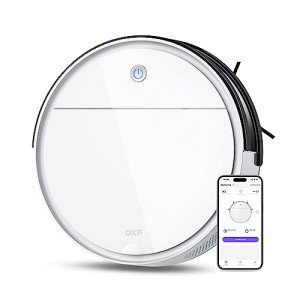Why You Should Focus On The Improvement Of Robotic Vacuums
The Rise of Robotic Vacuums: A Comprehensive Overview
In today's hectic world, technology is consistently progressing to make our lives simpler, and the home cleaning sector has experienced one of the most notable improvements: the robotic vacuum. Robotic Vacuum Cleaner conserves energy and time but likewise makes sure a cleaner home environment with very little manual effort. This short article dives into the fascinating advancement of robotic vacuums, how they work, their benefits and disadvantages, market trends, and future directions.
The Evolution of Robotic Vacuums
Robotic vacuums have actually made excellent strides since their beginning in the late 1990s. The very first commercially available robotic vacuum was presented in 1996, followed by numerous designs, each designed with escalating elegance and features. Here is a quick timeline of robotic vacuum advancement:
Year
Occasion
1996
Introduce of the very first robotic vacuum (Electrolux's Trilobite)
2002
iRobot Roomba is released, making robotics mainstream
2010
Intro of advanced mapping and navigation features
2017
Combination of AI and smart home compatibility
2022
Release of extremely advanced designs featuring self-emptying dustbins
How Robotic Vacuums Work
Robotic vacuums use a mix of sensing units, algorithms, and synthetic intelligence to navigate areas efficiently. Here's how they run:
Navigation: Most robotic vacuums utilize a series of sensors to identify challenges and navigate around furniture. Some high-end designs integrate LIDAR (Light Detection and Ranging) technology to develop comprehensive maps of the environment.
Cleaning Mechanisms: They are equipped with rotating brushes and suction systems to gather particles from various surface areas. Depending on the model, they can shift in between carpets and hard floors seamlessly.
Smart Features: Many modern robotic vacuums are Wi-Fi allowed, permitting users to control them from another location by means of a mobile phone app. Features commonly consist of scheduling, drawing up cleaning courses, and combination with other smart home gadgets.
Self-Maintenance: High-end units might include self-emptying capabilities, where the robot can dock itself to a base that gathers dust and particles without human intervention.
Benefits of Robotic Vacuums
Robotic vacuums have actually garnered tremendous popularity, and for good factors. Here are a few of the most substantial benefits:
- Time-Saving: Automating the cleaning procedure permits users to take part in other meaningful activities.
- Effective Cleaning: Regular cleaning can be quickly achieved by arranging the robot to clean everyday or weekly, keeping dirt and allergens at workable levels.
- Compact Design: Their little size allows them to fit under furnishings and in hard-to-reach places.
In spite of their advantages, robotic vacuums also include limitations:
- Limited suction power: While they are efficient for keeping clean floorings, they might not match the deep cleaning of traditional vacuums.
- Battery life: Most models need to return to their dock after a certain period of use.
- Preliminary costs: High-quality robotic vacuums can be expensive, though rates have actually been decreasing with advancements in technology.
Current Market Trends
The marketplace for robotic vacuums is broadening quickly. According to a current marketing research report, the global robotic vacuum cleaner market is anticipated to reach ₤ 7.2 billion by 2027, growing at a CAGR of 23.5%, driven by numerous elements:
Increased Adoption of Smart Home Devices
The increase of smart home innovation has encouraged customers to integrate robotic vacuums into their households. Numerous robotic vacuums work perfectly with home assistants like Amazon Alexa and Google Assistant, streamlining their operation.
Advances in Robotics and AI
As the technology behind robotic vacuums evolves, models are being geared up with better navigation systems, AI algorithms for discovering individual cleaning practices, and improved functions for particular floor types.
Concentrate on Health and Hygiene
The increased awareness of cleanliness and hygiene, especially due to current international occasions, has driven customers to purchase devices that frequently eliminate dust, irritants, and pet hair from their homes.
Future Directions
As innovation advances, robotic vacuums are expected to evolve further, including functions that increase their efficiency in families. Expected developments consist of:
- Improved AI Learning: With developments in artificial intelligence, future models will be much better at comprehending their environment and adapting to the needs of their owners.
- Multi-Purpose Design: Potential future models may include features for mopping, decontaminating, and air filtration in addition to vacuuming.
- Sustainability: As eco-consciousness rises, manufacturers are likely to focus on energy efficiency, recyclable products, and sustainable production practices.
Frequently Asked Questions About Robotic Vacuums
**1. Can robotic vacuums vacuum on carpet?Yes, most robotic vacuums can transition between various floor types, including carpets and hard floors. 2. How frequently need to I run my robotic vacuum?It depends
on your home's cleaning requirements, but lots of users
arrange their robotic vacuums to run everyday or every number of days. 3. Are robotic vacuums worth the investment?For numerous consumers, the time saved and benefit provided by robotic vacuums makes them beneficial,
**
particularly for hectic families. 4. Can I control my robotic vacuum remotely?Most modern robotic vacuums can be managed through a smart device app, enabling scheduling and monitoring from anywhere. 5. Do I still need a standard vacuum cleaner?While robotic vacuums effectively handle everyday cleaning, a traditional vacuum might still be needed for deep cleans or hardermesses. The improvement of robotic vacuums shows a considerable leap in automating household chores, combining innovative technology with easy to use operation. As the pattern toward smart homes continues and consumer expectations evolve, robotic vacuums will likely keep enhancing, providing ever-greater convenience and efficiency in preserving tidy living spaces. As homeowners think about the potential advantages and limitations of these devices, it is clear that robotic vacuums have strengthened their reputation as vital tools in contemporary home management. 